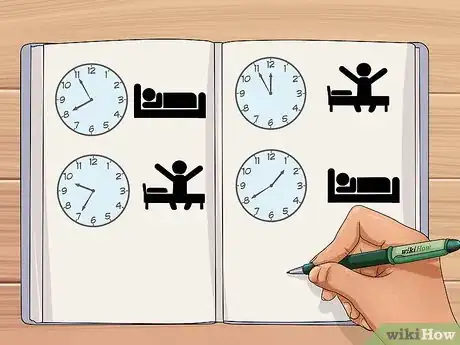This article was co-authored by Trudi Griffin, LPC, MS. Trudi Griffin is a Licensed Professional Counselor in Wisconsin specializing in Addictions and Mental Health. She provides therapy to people who struggle with addictions, mental health, and trauma in community health settings and private practice. She received her MS in Clinical Mental Health Counseling from Marquette University in 2011.
There are 11 references cited in this article, which can be found at the bottom of the page.
This article has been viewed 13,511 times.
Journaling can be a therapeutic way of expressing your thoughts and feelings. Keeping a journal allows you to reflect on your life in different ways, take note of patterns in your life, and track your progress over time. Particularly with Bipolar disorder, journaling can be largely beneficial for tracking symptoms and markers that can indicate problems in mental health. While managing Bipolar disorder can be difficult, a journal can be a helpful companion during treatment.
Steps
Starting a Journaling Habit
-
1Set your intent. While some people enjoy journaling as a way to chronicle their daily lives, a journal for Bipolar disorder will probably look different. Instead of talking about each day, you may choose to discuss your thoughts, emotions, and behaviors as a way to help you. Journaling is linked to certain health benefits, and it can also help you problem solve and lower stress.[1] If you're ready to start a journal, make sure you're ready to be introspective and reflective on your life and in your writing.[2]
- Decide how you want to set up your journal and what purpose it will serve for you. Your journal format can change at any time so that it is most beneficial to you.
-
2Choose a time each day to journal. For journaling to be most effective, aim to journal every day or most days.[3] Choose to journal in the morning when you first wake up, or at night before you go to bed. You may also wish to carry a journal with you throughout the day to write in.
- You may choose to have a paper journal, computer journal, or online journal.
- Keep your journal accessible. For instance, if you use a paper journal, keep a pen handy.
Advertisement -
3Set aside time for journaling. Don't rely on journaling to “fit into” your day. Instead, make time for journaling. Set aside 20 minutes each day specified for journaling.[4] You may wish to have a special place to journal, or a certain ritual to go along with your journaling, such as enjoying a cup of tea or putting on calm, relaxing music.
- Setting the scene and specifying time for journaling can help ensure that you continue your habit each day.
-
4Keep your journal confidential. In order for you to feel safe and able to fully express yourself, keep your journal private.[5] If you keep your journal at home, you may consider putting it in a safe place or telling those you live with that your journal is private. If your journal is online, check your privacy setting to ensure it is locked to outsiders.
- Sharing your journal may be beneficial at some time. Feel free to share your journal if you feel it will be helpful.
Managing Symptoms Through Journaling
-
1Report your sleep.[6] Each day, write down how much sleep you had the night before. Tracking sleep is an important part of managing Bipolar disorder, as changes in sleep patterns may indicate disruption and can contribute to relapse.[7]
- You may want to describe your sleep (“Went to sleep at 9pm; woke up 2x during the night, then fell back asleep. Woke up feeling rested this morning”) or you may indicate your sleep with a number. If using a number system, decide what each number means. For instance, a one may mean “no rest at all” and a 10 may mean, “overslept and still tired.”
-
2Keep a record of your emotions. Journal your emotions every day.[8] You may want to check in each day by denoting a dominant emotion or mood, such “angry,” “sad,” or “confused.” You may also want to check in with your stress level (on a scale of one through 10). Over time, you can reflect on this information to clue you in on any patterns of your behavior.
- For instance, you may notice that you tend to show more manic symptoms when you are stressed or very emotional, or your emotions are stronger at night.
-
3Track your moods. You may choose to track your moods as related to Bipolar disorder. When tracking moods, keep it simple and predictable so you can look back on the information easily. Describe your mood for the day, or if your moods changed, describe the changes. For instance, you may write “stable mood” for the morning, then, “depressed mood” at night. You may feel manic all day, depressed all day, or you may cycle throughout the day. Write this information down as your become aware of it.[9]
- Throughout time, you may realize that your moods are affected by traveling or by the weather.
-
4Note any external changes. Changes made to any part of your life can be beneficial to have in writing. If you go to your psychiatrist and you change medication, write it down. You can also write down any side effects you experience and how they change. You may also wish to write down any life changes that occur, such as moving, having a fight with your parents, change in jobs, etc.
-
5Pay attention to changing behaviors. Use your journal to reflect on your current behavior and look back on previous behavior. Ask yourself if your habits have changed recently in a way that suggests mania, such as talking faster, taking on large projects, or running around cleaning. Also, note any changes that denote depression such as slowed speech or body movements, spending more time isolating, feeling apathetic or having no energy.[10]
- If you are lacking awareness in monitoring your own behavior, ask a loved one or therapist to help you identify manic or depressive symptoms. The honest feedback may help you begin to identify these behaviors yourself.[11]
-
6Monitor your thoughts. Note in your journal whether you're having racing thoughts or slow thinking. Ask yourself, “What's occurring in my mind?” Assess whether your thoughts are linear or disjointed. Do your thoughts appear to make sense to other people? Do your thoughts make sense to you? Is it difficult to think or devote energy to thinking?
- Your journal may disclose this information by default if you are manic. Notice any changes in handwriting or if your entries have changed at all.
Using Writing Exercises for Coping
-
1Explore your feelings. Identifying your emotions can help you gain control of your emotions even when they feel out of control. You may feel down or depressed. Take these feelings one step further: are these feelings based in guilt or shame? Increase your awareness of each emotion you feel, and this can help you intervene sooner.[12]
- Where do you feel the emotion in your body? What thoughts or memories come to mind with the feeling?
- Increase your awareness of this experience with emotion. Draw a picture that represents the emotion. What color is it or how many colors are present? Are the lines smooth, straight, jagged, or non-existent? How does it interact with other emotions?
-
2Write a letter to yourself.[13] Interact with your past or future self through your journal. Write to your past self and say the things you wish someone would have told you then. Write to your future self with your hopes, dreams, and goals. What would you tell your past self to do more of, or to let go? What would you tell your future self to work toward?
- You can also write a letter to someone in your life, either someone you care about, someone who has passed, or someone you have a grievance toward. What would you say to this person if given the chance?
-
3Explore various viewpoints. Depression can make you feel like you have no options and all outcomes appear dull. Examining situations from different perspectives may help you expand your viewpoint beyond yourself.[14] If you feel stuck in life, helpless or hopeless, think about writing from someone else's viewpoint, like that of your sibling, an acquaintance, or your therapist.
- How would these people interact with your feelings if those feelings were their own? What would they say to you? How would someone who inspires you respond to the situation? What would he or she say in a pep talk to you?
-
4Stay action-oriented. While you are encouraged to write your thoughts and feelings, be careful not to get “stuck” on negative feelings, regrets, guilt, or shame in your writing. Rumination is a symptom of depression, and can drag you further into feelings of depression.[15] Rumination keeps you from problem-solving. If you find yourself ruminating, focus on solving the problem, or at least coming to terms with problems in a way that you can accept.[16]
- After writing negative things down in your journal, change the focus into how to solve the problems and move past them.
-
5Let hurtful things go. You may feel upset or angry or sad about a situation. Write out all of your emotions and pain and why you feel justified in feeling that way. If you're mad at someone, write all the things you wish to say to that person, even the really mean things. At the end of the letter, acknowledge what happened, how it affected you, and more importantly, that you are willing to let it go and live without it.
- When you're done, you may signify your disengagement by ripping the page out of your journal and burning it.[17] You can also keep it in your journal to reflect upon. You may return to the page to see how the situation or your feelings have changed with time.
- You can also express gratitude for the situation in allowing you to learn and grow, despite it being uncomfortable.
-
6Reflect on past entries. Periodically reflect on past journal entries in order to gain perspective and to gather inspiration.[18] This process can help you track your ups and downs, and can remind you of coping strategies that worked well. It can also remind you of the difficult periods of life you were able to get through and how you did it.
- Make a habit of rereading old journal entries.
References
- ↑ http://psychcentral.com/blog/archives/2012/05/02/4-journaling-exercises-to-help-you-manage-your-emotions/
- ↑ http://www.goodtherapy.org/learn-about-therapy/types/journal-therapy
- ↑ https://www.urmc.rochester.edu/encyclopedia/content.aspx?ContentTypeID=1&ContentID=4552
- ↑ http://www.depressiontoolkit.org/takecare/journaling.asp
- ↑ http://www.depressiontoolkit.org/takecare/journaling.asp
- ↑ http://www.everydayhealth.com/hs/bipolar-depression/keeping-a-bipolar-disorder-mood-diary/
- ↑ http://www.ncbi.nlm.nih.gov/pmc/articles/PMC3321357/
- ↑ https://www.urmc.rochester.edu/encyclopedia/content.aspx?ContentTypeID=1&ContentID=4552
- ↑ http://www.everydayhealth.com/hs/bipolar-depression/keeping-a-bipolar-disorder-mood-diary/
- ↑ https://www.nimh.nih.gov/health/topics/bipolar-disorder/index.shtml
- ↑ https://www.psychologytoday.com/blog/what-is-your-true-north/201509/know-thyself-how-develop-self-awareness
- ↑ http://psychcentral.com/blog/archives/2012/05/02/4-journaling-exercises-to-help-you-manage-your-emotions/
- ↑ http://www.goodtherapy.org/learn-about-therapy/types/journal-therapy
- ↑ https://www.psychologytoday.com/blog/anger-in-the-age-entitlement/201309/the-good-and-the-bad-journaling
- ↑ http://www.apa.org/monitor/nov05/cycle.aspx
- ↑ https://www.urmc.rochester.edu/encyclopedia/content.aspx?ContentTypeID=1&ContentID=4552
- ↑ http://psychcentral.com/blog/archives/2015/04/06/4-ways-to-rediscover-yourself-after-an-unhealthy-relationship/
- ↑ http://www.goodtherapy.org/learn-about-therapy/types/journal-therapy
























-Episode-Step-22.webp)














































Medical Disclaimer
The content of this article is not intended to be a substitute for professional medical advice, examination, diagnosis, or treatment. You should always contact your doctor or other qualified healthcare professional before starting, changing, or stopping any kind of health treatment.
Read More...